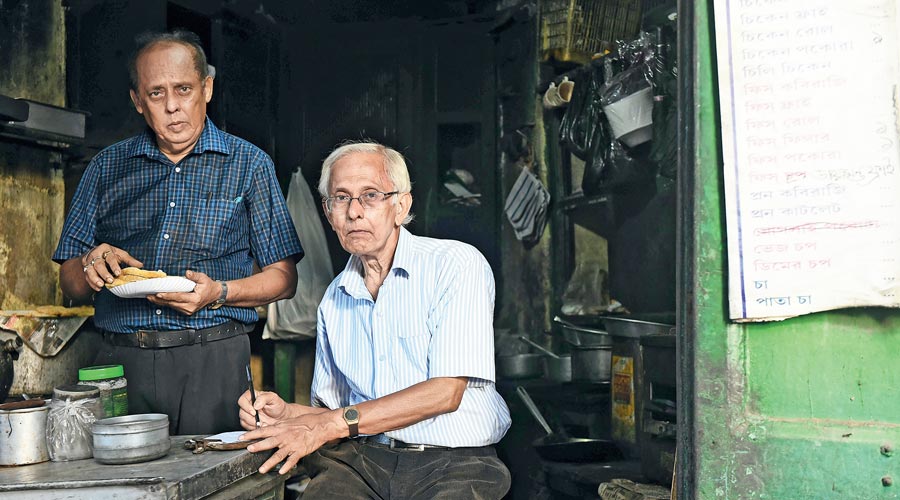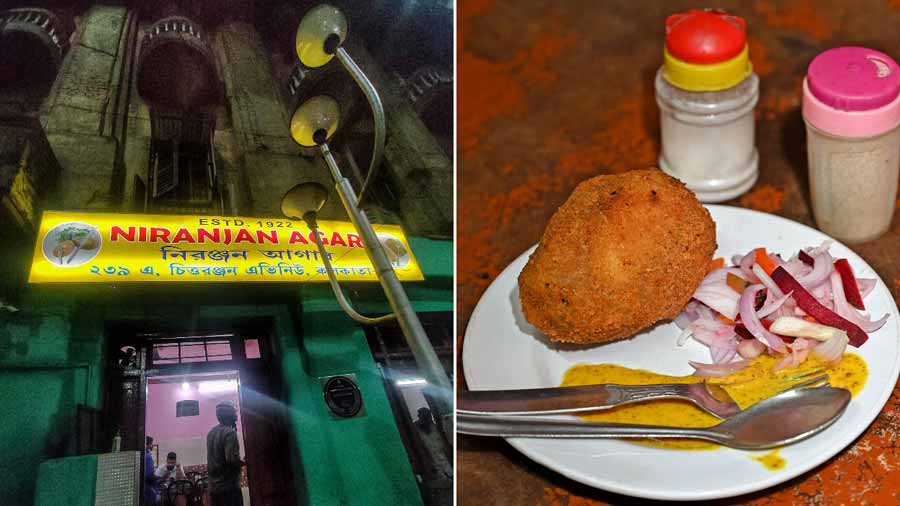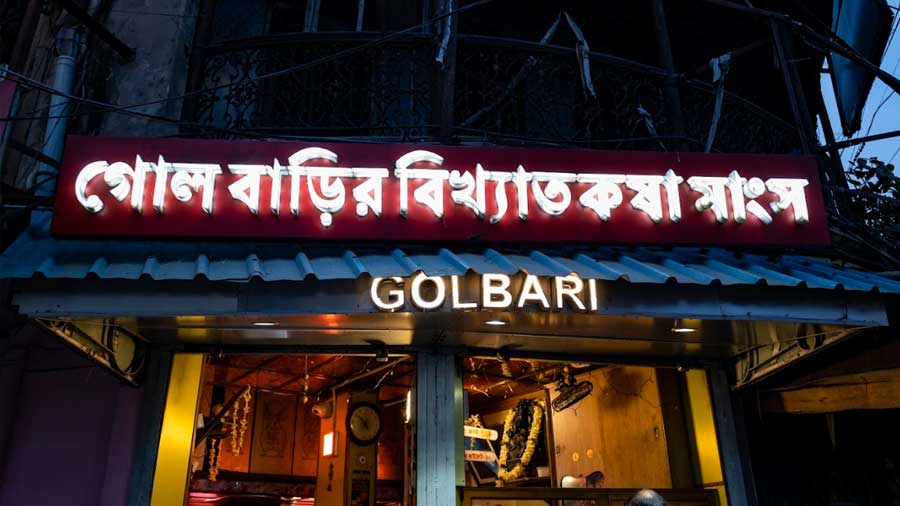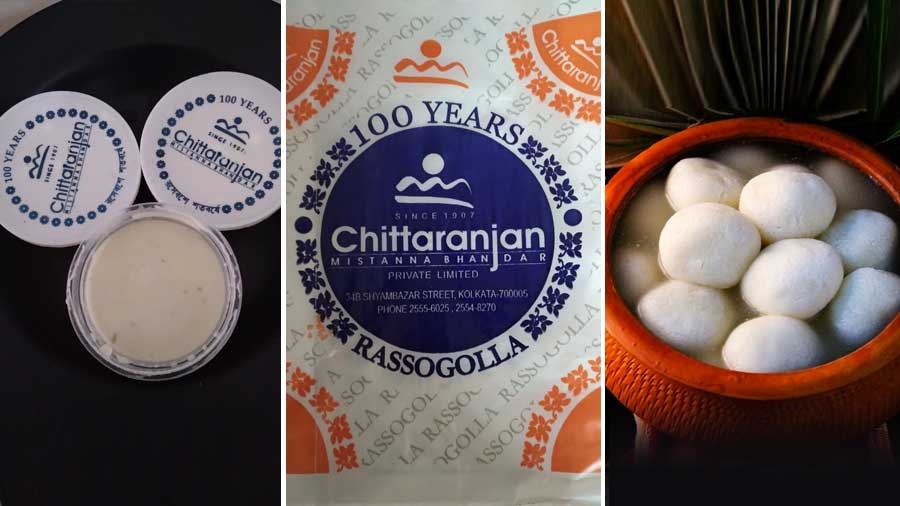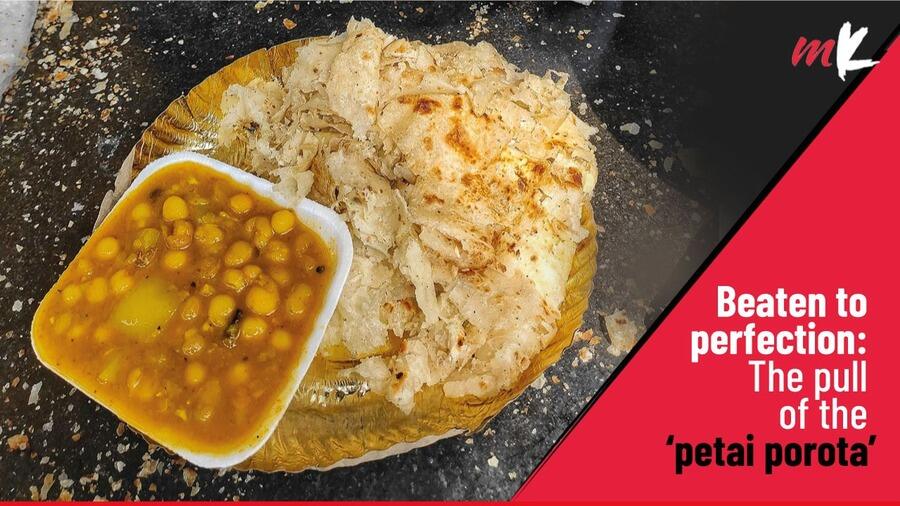Nostalgia can be a deceiving thing. For example, all Kolkata “fish fries” may not be delectable just because they represent a tradition that is considered glorious because it blends the East and the West with such perfection, at an affordable price, from a time the word “fusion” was not predominantly applicable to culture, or particularly to food.
Even in a famous fish fry, the fish may be scanty, the Indian spice mix too overwhelming and the crumb-coat so hard that you can use it as a blunt weapon against which no nostalgia can act as protection. Which again proves that all forms of the past that persist, which include some fish fries and a few other things, are not necessarily good. They can justify the worst, on our palate, in a nation.
But the fish fry at Panchu Babur Dokan in Kidderpore in southwest Kolkata, more than 80 years old, does not require nostalgia.
It is just good, with the flaky fish smelling of the right amount of spices resting between soft, crisp crumb covers. The other items on offer are also vintage and delicious: mutton stew, mutton curry, chicken stew, chicken cutlet, liver curry, fish roll, fish finger, kaviraj of different types, all Kolkata classics, a culinary canon of colonial legacy that we made our own.
Panchu Babur Dokan was established in 1940. Located in Diamond Harbour Road near Kidderpore market in an old Bengali neighbourhood, the snack and tea shop — the tea is made with leaves and not powder tea and is well-known for its flavour — is a local landmark.
Not only for the food, but also for what the food did.
“Our father Mrityunjoy Mukhopadhyay, who was from Nadia, started the shop,” says Apurba Mukherjee, 71, a gentle, smiling man who sits at the counter. His father was known as Panchu Babu, and that gave his eatery its name. This humble name remains unchanged, as does the appearance of the place, equally humble, in the more than eight decades. The small shop occupies a corner of a two-storey building that is crumbling. No signboard on top announces a name; only two plain boards on two sides list, one in English and the other in Bengali, the items available.
“Our father had started with daal-puri and aloo-dam though,” says Apurba. His younger brother Mohadeb, 63, joins the conversation. The two run the shop now, Mohadeb actively engaged in frying the friables, too, along with one or two other helpers.
“But from the very first the shop caught on,” says Apurba. It was the taste. “Our father would ensure the best quality ingredients,” adds Mohadeb, also soft-spoken and friendly. Quality, and their father’s ingenuity, helped, he adds. His shirt is drenched in sweat as he is frying a set of fish fingers on a hot July afternoon. Both brothers are self-effacing, hardly saying anything about themselves.
They live close to their shop, which now sells breakfast items, tea, toast, eggs, from early morning to 11am, and opens again around 3pm for the “chop-cutlets”.
“From the beginning the reputation spread by word of mouth. Not only people from the neighbourhood but also those from other parts of the city began to come to the shop,” says Apurba.
The locality was a completely different place then. Till the 1990s, it was a buzzing place. Factories dotted the area; men stopped on their way to work or on their way back home at the shop, for tea, or a bite. It helped that people would be walking then. There were fewer vehicles then. “Even buses were few,” says Apurba. Two markets, Kidderpore and Watgunge, were near, the latter now a shadow of its former self. The Kolkata port was healthier. There were not so many eateries around.
Panchu Babu himself was at the helm till his death in 1988 after which his four sons took over. Two of the brothers have passed away. Apurba is the eldest. The shop’s glory days coincided with their father’s lifetime.
Which also included the Icmic Cooker, in which Panchu Babu cooked the stews and the gravies. Icmic Cooker was a minor revolution. Invented by Indumadhav Mallick in 1910, it was a steam cooker in which several dishes could be cooked simultaneously, thereby making the food hygienIC and econoMIC. At Panchu Babu’s, the cooker would originally be placed on a charcoal stove, which gave the stews additional goodness. The goodness still remains, despite the gas stove now, but the Icmic Cooker had to be dropped a few months ago as there is no one around to make them now.
So the people kept coming. There was no place to sit, except when perhaps a bench was caught hold of or even balconies in neighbouring houses or just the pavement, which was always called “footpath” in the city, in front of the shop or across the street.
Among the visitors were the most famous. Panchu Babu’s was a happening place.
Through the 50s, 60s and 70s, till the early 90s, say the brothers, the shop would be full. In 2015, the shop’s 75th year, the Mukherjee brothers had brought out a small brochure to celebrate the occasion. It contained several reports on the shop in city newspapers, including one in The Statesman in the 70s.
Filmmaker Tarun Majumdar, who passed away a few days ago, was a regular. Theatre actor Satya Bandyopadhyay, who, the brothers point out, was not the actor Satya Banerjee, was another. Terrific conversations would follow over the aromatic tea.
Many players would also drop in. Several other personalities from the film and theatre world dropped in at Panchu Babu’s before going to the Kidderpore market where they could buy cloth required for productions at an affordable rate.
“Uttam Kumar had also dropped in,” says Apurba. Those were the early days of Uttam Kumar’s career, when the biggest star Bengali cinema had seen could drop in at a small shop and have tea, laughs Apurba.
One wonders if it is only the food that can draw many people and make them stay. You get a clue perhaps in the deep interest the brothers betray in culture — and the people around them. “Our father used to say that people wait here on the footpath standing. The food must be good enough,” says Mohadeb.
The most remarkable thing about the shop now, however, is that the current custodians of Panchu Babur Dokan do not make a precious thing of the past. They love to talk about it but without undermining, in any way, the present or the future. The shop, like the fish fry, remains safe from the side effects of nostalgia.
Devajit Bandyopadhyay, singer and scholar, an old timer, drops in. As he makes himself comfortable on the concrete put up around a large tree in front of the shop, he talks across the footpath to the brothers about Ratubabu, music director Ratu Mukhopadhyay. Ratubabu was famous for his adda here. An intense discussion follows.
At this point one wonders if Panchu Babur Dokan is an eatery or a place to talk about things that we have forgotten but could remember. The kind of place the city so wants.
